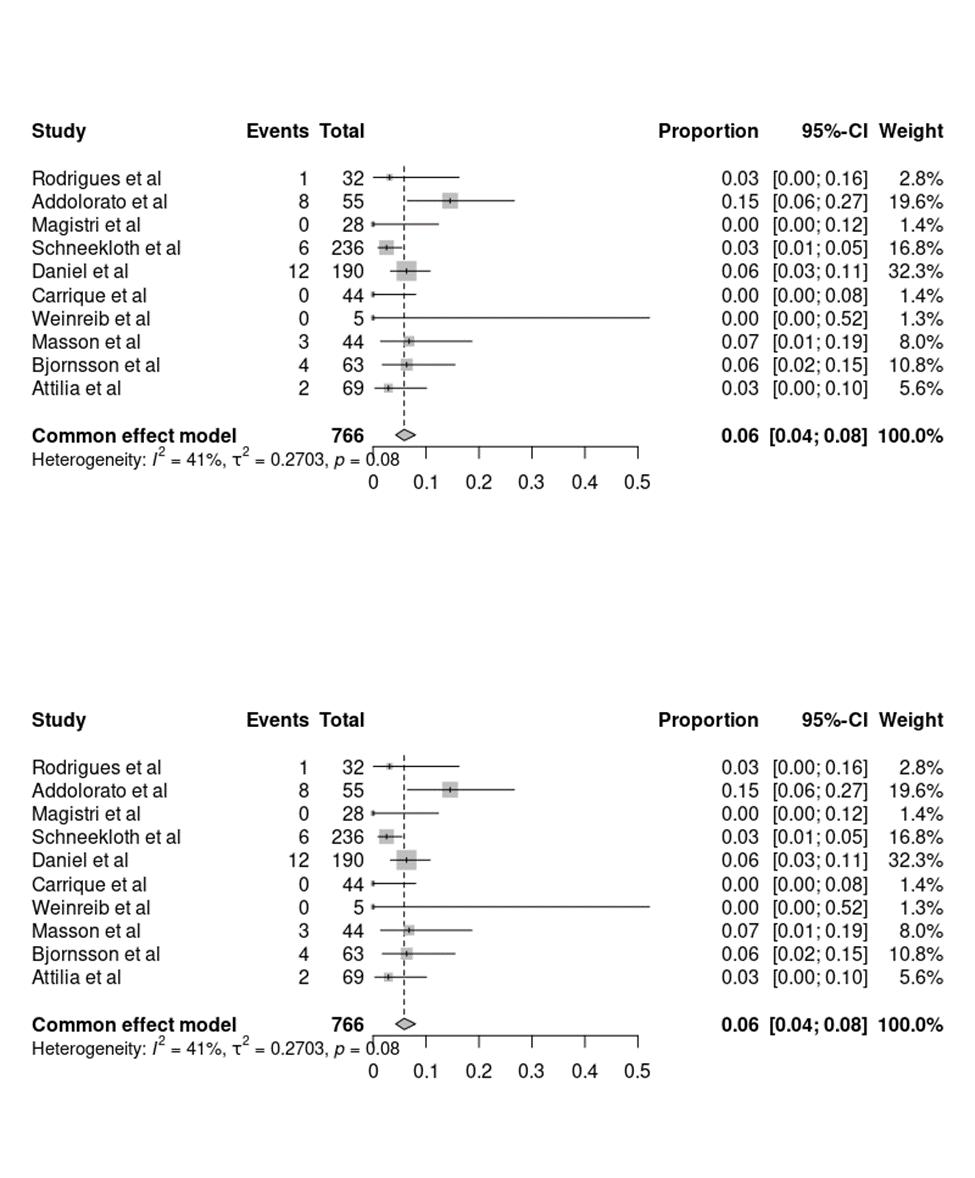Oral Paper Presentation
Annual Scientific Meeting
Session: Plenary Session 2A - Small Intestine / Functional / Liver
24 - Post Liver Transplantation Management of Alcohol Use Disorder Lowers Mortality and Risk of Relapse
Tuesday, October 29, 2024
9:20 AM - 9:30 AM ET
Location: Terrace Ballroom 1

Himsikhar Khataniar, MD
Allegheny General Hospital
Pittsburgh, PA
Presenting Author(s)
Himsikhar Khataniar, MD1, Omar Al'Taani, MD1, Muhammad Ali Butt, MD1, Shahid M. Malik, MD2, Nabeeha Mohyuddin, MD1
1Allegheny General Hospital, Pittsburgh, PA; 2University of Pittsburgh Medical Center, Pittsburgh, PA
Introduction: Alcohol liver disease (ALD) is a leading indication for liver transplantation (LT). Post-LT relapse rate is reported between 30-50% and is known to effect the graft and patient mortality. Post LT mortality for ALD is reported to be 20% in 5 years. Numerous behavioral and pharmacotherapeutic options for alcohol use disorder (AUD) have been proposed and tested in the pre-transplantation stage. However, knowledge of optimal management of AUD post-transplantation remains limited. This review aims to report and analyze findings from published data on interventions for LT recipients to prevent relapse and decrease mortality.
Methods: We systematically searched PubMed, MEDLINE, and Embase from their inception to September 2023 to identify studies reporting on interventions post-LT aimed at preventing alcohol relapse. We excluded case reports and studies with < 5 sample size. Meta-analysis was conducted using a random-effects model, and the results were presented in terms of pooled proportions along with corresponding 95% confidence intervals. Heterogeneity was assessed using the I2% statistic.
Results: Our search strategy identified ten studies encompassing a total of 766 patients (80.1%, male, mean age: 50.54±6.5) who were exposed to post LT interventions for AUD. There were seven studies that reported the use of only behavioral interventions, and three which reported the limited use of addiction medications (baclofen and naltrexone). Following continued treatment with any intervention (pharmacological or behavioral), the combined risk of relapse post LT was 19% (95%CI:13-26; I² = 64%). The aggregated risk of mortality was 6% (95%CI:4-8; I² = 43%). In a subgroup analysis of the three studies involving pharmacological interventions, the overall risk of relapse was found to be 17% (95%CI:13-22; I² = 0%). The risk of death in this subgroup was 7% (95%CI:1-50; I² = 82%). There were no significant differences between pharmacological and behavioral interventions in terms of relapse or mortality.
Discussion: This is the first meta-analysis examining interventions for AUD post LT. Reported mortality rates post liver transplant for ALD are up to 20% however, we found that in those receiving interventions for AUD post LT, mortality is lower at 6%. We also found a lower relapse rate (19% as compared to up to 30-50% reported in literature). Our data when compared to historical literature suggests that interventions decrease the risk of relapse and may in part be responsible for superior long term outcomes.

Disclosures:
Himsikhar Khataniar, MD1, Omar Al'Taani, MD1, Muhammad Ali Butt, MD1, Shahid M. Malik, MD2, Nabeeha Mohyuddin, MD1, 24, Post Liver Transplantation Management of Alcohol Use Disorder Lowers Mortality and Risk of Relapse, ACG 2024 Annual Scientific Meeting Abstracts. Philadelphia, PA: American College of Gastroenterology.
1Allegheny General Hospital, Pittsburgh, PA; 2University of Pittsburgh Medical Center, Pittsburgh, PA
Introduction: Alcohol liver disease (ALD) is a leading indication for liver transplantation (LT). Post-LT relapse rate is reported between 30-50% and is known to effect the graft and patient mortality. Post LT mortality for ALD is reported to be 20% in 5 years. Numerous behavioral and pharmacotherapeutic options for alcohol use disorder (AUD) have been proposed and tested in the pre-transplantation stage. However, knowledge of optimal management of AUD post-transplantation remains limited. This review aims to report and analyze findings from published data on interventions for LT recipients to prevent relapse and decrease mortality.
Methods: We systematically searched PubMed, MEDLINE, and Embase from their inception to September 2023 to identify studies reporting on interventions post-LT aimed at preventing alcohol relapse. We excluded case reports and studies with < 5 sample size. Meta-analysis was conducted using a random-effects model, and the results were presented in terms of pooled proportions along with corresponding 95% confidence intervals. Heterogeneity was assessed using the I2% statistic.
Results: Our search strategy identified ten studies encompassing a total of 766 patients (80.1%, male, mean age: 50.54±6.5) who were exposed to post LT interventions for AUD. There were seven studies that reported the use of only behavioral interventions, and three which reported the limited use of addiction medications (baclofen and naltrexone). Following continued treatment with any intervention (pharmacological or behavioral), the combined risk of relapse post LT was 19% (95%CI:13-26; I² = 64%). The aggregated risk of mortality was 6% (95%CI:4-8; I² = 43%). In a subgroup analysis of the three studies involving pharmacological interventions, the overall risk of relapse was found to be 17% (95%CI:13-22; I² = 0%). The risk of death in this subgroup was 7% (95%CI:1-50; I² = 82%). There were no significant differences between pharmacological and behavioral interventions in terms of relapse or mortality.
Discussion: This is the first meta-analysis examining interventions for AUD post LT. Reported mortality rates post liver transplant for ALD are up to 20% however, we found that in those receiving interventions for AUD post LT, mortality is lower at 6%. We also found a lower relapse rate (19% as compared to up to 30-50% reported in literature). Our data when compared to historical literature suggests that interventions decrease the risk of relapse and may in part be responsible for superior long term outcomes.

Figure: Figure 1. Forest plots indicating each study, proportion, as well as 95% CI and weights for mortality
Figure 2. Forest plots indicating each study, proportion, as well as 95% CI and weights for relapse
Figure 2. Forest plots indicating each study, proportion, as well as 95% CI and weights for relapse
Disclosures:
Himsikhar Khataniar indicated no relevant financial relationships.
Omar Al'Taani indicated no relevant financial relationships.
Muhammad Ali Butt indicated no relevant financial relationships.
Shahid M. Malik indicated no relevant financial relationships.
Nabeeha Mohyuddin indicated no relevant financial relationships.
Himsikhar Khataniar, MD1, Omar Al'Taani, MD1, Muhammad Ali Butt, MD1, Shahid M. Malik, MD2, Nabeeha Mohyuddin, MD1, 24, Post Liver Transplantation Management of Alcohol Use Disorder Lowers Mortality and Risk of Relapse, ACG 2024 Annual Scientific Meeting Abstracts. Philadelphia, PA: American College of Gastroenterology.

